The Music of Pakistan includes diverse elements ranging from music from various parts of South Asia as well as Central Asian, Middle Eastern, and modern-day Western popular music influences. With these multiple influences, a distinctive Pakistani music has emerged.
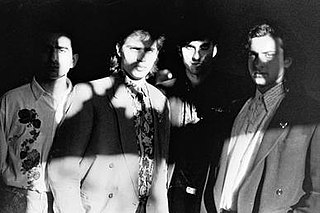
Vital Signs were a Pakistani pop and rock band formed in Rawalpindi in 1986 by two Peshawar University students. After their formation, they soon became Pakistan's first and most commercially successful as well as critically acclaimed act. The band's popular lineup consisted of keyboardist Rohail Hyatt, bassist Shahzad Hasan, guitarist Nusrat Hussain and vocalist Junaid Jamshed. Rooted in Rawalpindi with some influence from Western music during the conservative regime of President Zia-ul-Haq, the Vital Signs utilizes several genres, ranging from pop music to rock, and often incorporating classical and other elements in innovative ways. In the early 1990s, they came to be perceived by many Pakistani fans and country's cultural observers as a "promising new era of cultural revival". Their enormous popularity significantly opened a new wave of music and a modern chapter in the history of Pakistan.

Junoon is the debut album of the Pakistani sufi rock band Junoon, released on 30 September 1992. It was released by EMI and recorded at the EMI studios in Karachi in 1990. The album is produced by founder, songwriter and lead guitarist Salman Ahmad. The album contained a total track list of twelve songs with eight tracks being in Urdu language, three tracks in English and one instrumental.

Azadi is the fourth studio album and the fifth overall album of the Pakistani sufi rock band, Junoon. The album was released in 1997 and established the Sufi rock sound that the band pioneered on their previous album, Inquilaab. The album was popular worldwide, bringing fame to Junoon.

Ishq is the sixth studio album and the ninth overall album of the Pakistani sufi rock band, Junoon. The album was released on January 1, 2001 and was released by the title of Andaz outside Pakistan.

Sampooran is the debut album of the Pakistani rock band Mekaal Hasan Band, released on January 8, 2004. Singles from the album included "Rabba", released in 2003 and "Sajan", released in 2004.

Entity Paradigm was a Pakistani rock band from Lahore, Punjab, formed in 2000. The band was founded by songwriter and guitarist Xulfi, vocalist, songwriter Fawad Khan and keyboardist and vocalist Ahmed Ali Butt who were soon joined by Salman Albert on guitars, Ali Asad Khan on drums, Hassaan Khalid on rhythm guitars and Waqar Ahmed on drums, since then there had been many changes in the line-up the only consistent members being Ahmed Ali Butt, Salman Albert, and Hassaan Khalid.
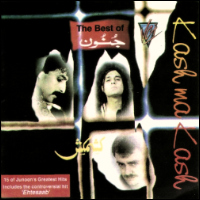
Kashmakash is the first compilation album and third overall album of the Pakistani rock band, Junoon. It is said to be the first compilation album by a pop band in Pakistan. Junoon was taken to court for the controversy generated by the video for "Ehtesaab", which included footage of a polo pony eating in a posh restaurant. Many thought the image was an indictment of the corrupt Pakistani political elite, and especially of former Prime Minister Benazir Bhutto. The government quickly banned the song and video from state television.
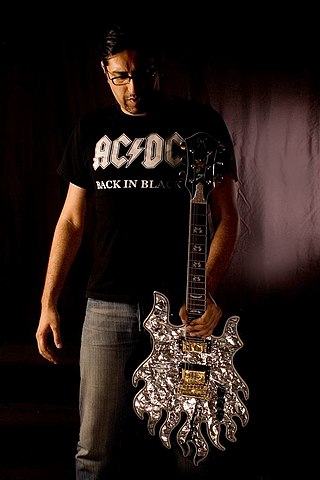
Asad Ahmed is a Pakistani guitarist. His first stint was forming The Barbarians. He has been a member of the famous pop trio Awaz, has played with Junoon, Vital Signs and was a founding member of the rock band Karavan. Asad is considered as the founder of Rock Music in Pakistan. He is currently a Solo Artist.

Karavan was a hard rock band from district Karachi, Sindh, Pakistan, formed in 1997. The band was founded by former Awaz lead guitarist Asad Ahmed with bassist Sameer Ahmed, who were soon joined by drummer Allan Smith and vocalist Najam Sheraz. Karavan is known for fusing Eastern percussion and melodies with modern rock. Since its inception, the group has released five albums, including four studio albums and one live album.
Overload is a Pakistani rock band from Lahore, Punjab, formed in August 2003. The group is directed by producer, lead vocalist and drummer, Farhad Humayun and keyboard/synth player, songwriter and composer, Sheraz Siddiq, who were soon joined by Hassan Mohyeddin on percussion along with dhol players Pappu Sain and Jhura Sain. The band is regarded by some critics as being the 'Loudest band in Pakistan'.
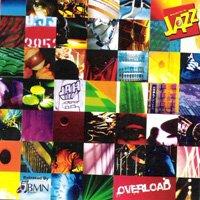
Overload is the debut album by the Pakistani rock band Overload, released in 2006. Singles from their debut album were "Cursed", "Storm" and "Dhamaal".

Strings was a Pakistani pop/rock band composed of two members, plus four live band members from Karachi, Pakistan. The band was initially formed by four college students—Bilal Maqsood, Faisal Kapadia (vocals), Rafiq Wazir Ali (synthesizer) and Kareem Bashir Bhoy —in 1988. In 1992 the quartet disbanded, only to make a comeback with Maqsood and Kapadia in 2000. While the initial band rode the new wave of Pakistani pop music, the later lineup ushered a revival in the Pakistani music industry.
Mahmood Rahman is a Pakistani guitarist and former member of the Lahore-based rock band Overload.

Talaash is the second studio album of the Pakistani sufi rock band Junoon, released on September 3, 1993. The album was to be their first with bassist Brian O'Connell, who joined the band after Nusrat Hussain departed from the band to pursue his career as a solo artist and released his debut album Amrit in 1992. This was also the first Junoon album produced by Salman Ahmad and O'Connell, both also went on releasing several other albums by Junoon before O'Connell left the band after Dewaar in 2003. The album also served as a soundtrack for the Pakistani television show Talaash, which featured the band and its novel storyline was based on the band.
"Ajab Tamasha" is a song by the Pakistani rock band Entity Paradigm. The song along with the music video was released on 21 December 2012 as part of the band's tenth anniversary. This is the first single released after the departure of Fawad Khan, who left to focus on his acting career and Drummer "Waqar Khan" who left because he moved from Lahore to Islamabad.
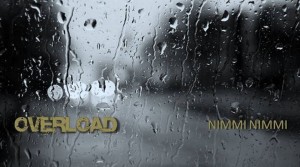
"Nimmi Nimmi" is a 2014 single by the Pakistani rock band Overload. It was released on November 24, 2014, in Pakistan as a digital download, Regarded as a most awaited released by band, it is their first single after almost a year. "Nimmi Nimmi" is a soulful-love ballad in which male protagonist vows to his lover with her memories after being left alone. The song is written, directed and produced by Farhad while Sheraz serves as a co-producer and synthesizer.
Farhad Humayun was a Pakistani singer, drummer, record producer and video artist. He was popularly associated with the Pakistani drum jam band Overload which he founded in 2003. Farhad started his career as underground musician and formed two bands Co-Ven and Mindriot as a drummer. He worked with artists such as Atif Aslam, Symt, Maha Ali Kazmi and Meesha Shafi. Humayun received many awards and accolades for his work. He was also the owner of Riot Studios, a recording studio and music performance venue in Lahore.
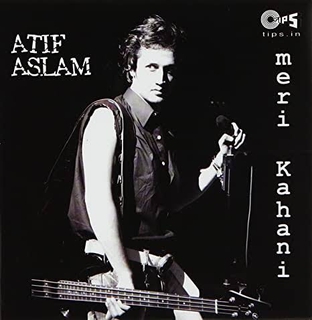
After the success of first two albums, Atif Aslam released his third solo album Meri Kahani in 2008. This album was produced by Sarmad Abdul Ghafoor.














